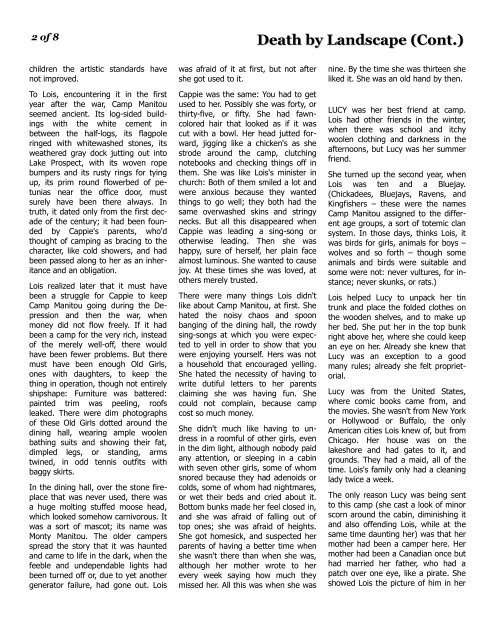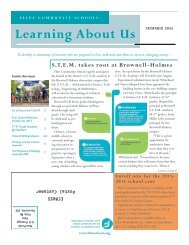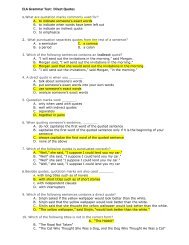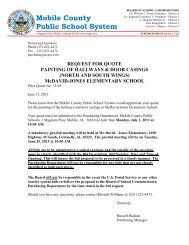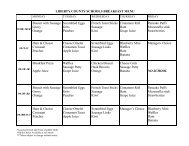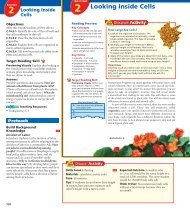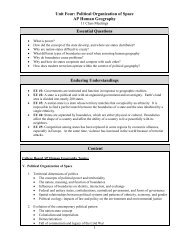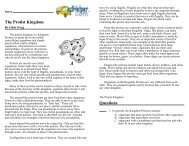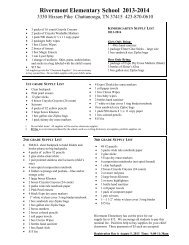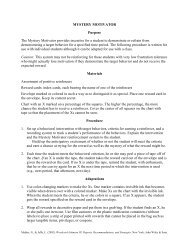Death by Landscape by Margaret Atwood - Baby's First Year
Death by Landscape by Margaret Atwood - Baby's First Year
Death by Landscape by Margaret Atwood - Baby's First Year
Create successful ePaper yourself
Turn your PDF publications into a flip-book with our unique Google optimized e-Paper software.
2 of 8 <strong>Death</strong> <strong>by</strong> <strong>Landscape</strong> (Cont.)<br />
children the artistic standards have<br />
not improved.<br />
To Lois, encountering it in the first<br />
year after the war, Camp Manitou<br />
seemed ancient. Its log-sided buildings<br />
with the white cement in<br />
between the half-logs, its flagpole<br />
ringed with whitewashed stones, its<br />
weathered gray dock jutting out into<br />
Lake Prospect, with its woven rope<br />
bumpers and its rusty rings for tying<br />
up, its prim round flowerbed of petunias<br />
near the office door, must<br />
surely have been there always. In<br />
truth, it dated only from the first decade<br />
of the century; it had been founded<br />
<strong>by</strong> Cappie's parents, who'd<br />
thought of camping as bracing to the<br />
character, like cold showers, and had<br />
been passed along to her as an inheritance<br />
and an obligation.<br />
Lois realized later that it must have<br />
been a struggle for Cappie to keep<br />
Camp Manitou going during the Depression<br />
and then the war, when<br />
money did not flow freely. If it had<br />
been a camp for the very rich, instead<br />
of the merely well-off, there would<br />
have been fewer problems. But there<br />
must have been enough Old Girls,<br />
ones with daughters, to keep the<br />
thing in operation, though not entirely<br />
shipshape: Furniture was battered:<br />
painted trim was peeling, roofs<br />
leaked. There were dim photographs<br />
of these Old Girls dotted around the<br />
dining hall, wearing ample woolen<br />
bathing suits and showing their fat,<br />
dimpled legs, or standing, arms<br />
twined, in odd tennis outfits with<br />
baggy skirts.<br />
In the dining hall, over the stone fireplace<br />
that was never used, there was<br />
a huge molting stuffed moose head,<br />
which looked somehow carnivorous. It<br />
was a sort of mascot; its name was<br />
Monty Manitou. The older campers<br />
spread the story that it was haunted<br />
and came to life in the dark, when the<br />
feeble and undependable lights had<br />
been turned off or, due to yet another<br />
generator failure, had gone out. Lois<br />
was afraid of it at first, but not after<br />
she got used to it.<br />
Cappie was the same: You had to get<br />
used to her. Possibly she was forty, or<br />
thirty-five, or fifty. She had fawncolored<br />
hair that looked as if it was<br />
cut with a bowl. Her head jutted forward,<br />
jigging like a chicken's as she<br />
strode around the camp, clutching<br />
notebooks and checking things off in<br />
them. She was like Lois's minister in<br />
church: Both of them smiled a lot and<br />
were anxious because they wanted<br />
things to go well; they both had the<br />
same overwashed skins and stringy<br />
necks. But all this disappeared when<br />
Cappie was leading a sing-song or<br />
otherwise leading. Then she was<br />
happy, sure of herself, her plain face<br />
almost luminous. She wanted to cause<br />
joy. At these times she was loved, at<br />
others merely trusted.<br />
There were many things Lois didn't<br />
like about Camp Manitou, at first. She<br />
hated the noisy chaos and spoon<br />
banging of the dining hall, the rowdy<br />
sing-songs at which you were expected<br />
to yell in order to show that you<br />
were enjoying yourself. Hers was not<br />
a household that encouraged yelling.<br />
She hated the necessity of having to<br />
write dutiful letters to her parents<br />
claiming she was having fun. She<br />
could not complain, because camp<br />
cost so much money.<br />
She didn't much like having to undress<br />
in a roomful of other girls, even<br />
in the dim light, although nobody paid<br />
any attention, or sleeping in a cabin<br />
with seven other girls, some of whom<br />
snored because they had adenoids or<br />
colds, some of whom had nightmares,<br />
or wet their beds and cried about it.<br />
Bottom bunks made her feel closed in,<br />
and she was afraid of falling out of<br />
top ones; she was afraid of heights.<br />
She got homesick, and suspected her<br />
parents of having a better time when<br />
she wasn't there than when she was,<br />
although her mother wrote to her<br />
every week saying how much they<br />
missed her. All this was when she was<br />
nine. By the time she was thirteen she<br />
liked it. She was an old hand <strong>by</strong> then.<br />
LUCY was her best friend at camp.<br />
Lois had other friends in the winter,<br />
when there was school and itchy<br />
woolen clothing and darkness in the<br />
afternoons, but Lucy was her summer<br />
friend.<br />
She turned up the second year, when<br />
Lois was ten and a Bluejay.<br />
(Chickadees, Bluejays, Ravens, and<br />
Kingfishers – these were the names<br />
Camp Manitou assigned to the different<br />
age groups, a sort of totemic clan<br />
system. In those days, thinks Lois, it<br />
was birds for girls, animals for boys –<br />
wolves and so forth – though some<br />
animals and birds were suitable and<br />
some were not: never vultures, for instance;<br />
never skunks, or rats.)<br />
Lois helped Lucy to unpack her tin<br />
trunk and place the folded clothes on<br />
the wooden shelves, and to make up<br />
her bed. She put her in the top bunk<br />
right above her, where she could keep<br />
an eye on her. Already she knew that<br />
Lucy was an exception to a good<br />
many rules; already she felt proprietorial.<br />
Lucy was from the United States,<br />
where comic books came from, and<br />
the movies. She wasn't from New York<br />
or Hollywood or Buffalo, the only<br />
American cities Lois knew of, but from<br />
Chicago. Her house was on the<br />
lakeshore and had gates to it, and<br />
grounds. They had a maid, all of the<br />
time. Lois's family only had a cleaning<br />
lady twice a week.<br />
The only reason Lucy was being sent<br />
to this camp (she cast a look of minor<br />
scorn around the cabin, diminishing it<br />
and also offending Lois, while at the<br />
same time daunting her) was that her<br />
mother had been a camper here. Her<br />
mother had been a Canadian once but<br />
had married her father, who had a<br />
patch over one eye, like a pirate. She<br />
showed Lois the picture of him in her


